“like”前与后-like的用法
- 格式:doc
- 大小:15.50 KB
- 文档页数:2
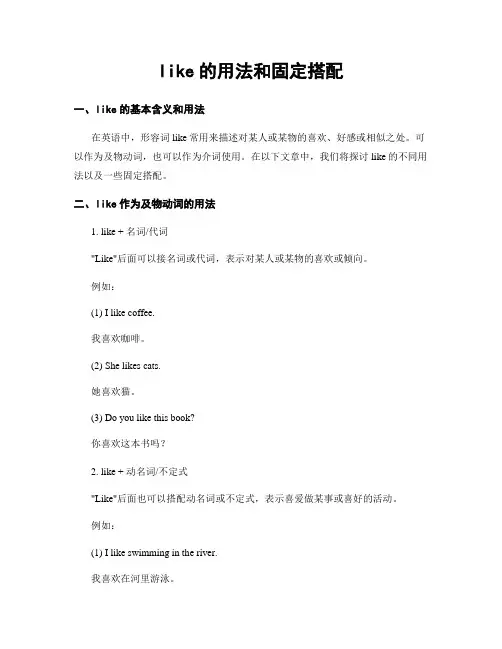
like的用法和固定搭配一、like的基本含义和用法在英语中,形容词like常用来描述对某人或某物的喜欢、好感或相似之处。
可以作为及物动词,也可以作为介词使用。
在以下文章中,我们将探讨like的不同用法以及一些固定搭配。
二、like作为及物动词的用法1. like + 名词/代词"Like"后面可以接名词或代词,表示对某人或某物的喜欢或倾向。
例如:(1) I like coffee.我喜欢咖啡。
(2) She likes cats.她喜欢猫。
(3) Do you like this book?你喜欢这本书吗?2. like + 动名词/不定式"Like"后面也可以搭配动名词或不定式,表示喜爱做某事或喜好的活动。
例如:(1) I like swimming in the river.我喜欢在河里游泳。
(2) He doesn't like to cook.他不喜欢做饭。
3. would like + to do当表达对于未来某个动作的愿望时,可以使用"would like + to do"结构。
它通常用于礼貌地请求或询问意见。
例如:(1) Would you like to have dinner with me?你愿意和我一起吃晚饭吗?(2) I would like to visit Paris someday.我希望有朝一日能够去巴黎。
三、like作为介词的用法1. like + 名词/代词"Like"后面可以接名词或代词,表示类似或相似之处。
例如:(1) She looks like her mother.她长得像她妈妈。
(2) It tastes like chicken.它的味道像鸡肉。
2. be like + 名词/代词当描述某人或某物的特征、性格时,可以使用"be like + 名词/代词"结构。
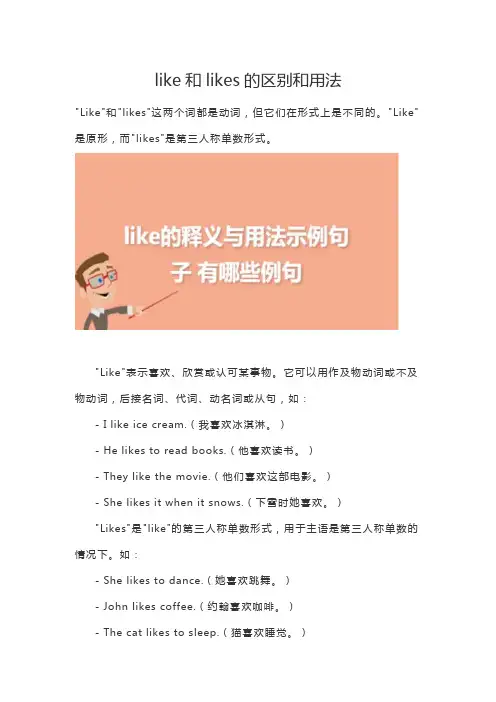
like和likes的区别和用法"Like"和"likes"这两个词都是动词,但它们在形式上是不同的。
"Like"是原形,而"likes"是第三人称单数形式。
"Like"表示喜欢、欣赏或认可某事物。
它可以用作及物动词或不及物动词,后接名词、代词、动名词或从句,如:- I like ice cream.(我喜欢冰淇淋。
)- He likes to read books.(他喜欢读书。
)- They like the movie.(他们喜欢这部电影。
)- She likes it when it snows.(下雪时她喜欢。
)"Likes"是"like"的第三人称单数形式,用于主语是第三人称单数的情况下。
如:- She likes to dance.(她喜欢跳舞。
)- John likes coffee.(约翰喜欢咖啡。
)- The cat likes to sleep.(猫喜欢睡觉。
)除了第三人称单数的情况外,"likes"还可以是现在时态的被动语态。
但这种用法比较少见,如:- The painting likes to be admired.(这幅画喜欢被赞赏。
)总的来说,"like"和"likes"是用来描述喜欢、欣赏和认同某事物的动词,唯一的区别在于前者是原形,后者是第三人称单数形式,适用于不同的主语时态。
"like" 和"likes" 都是表示"喜欢" 的动词,但它们在用法上有所不同。
首先,"like" 是一个基本动词形式,用于第一人称(I)、第二人称(you)和第三人称单数(he/she/it)的主语和其对应的动词时,例如:- I like ice cream.(我喜欢冰淇淋。
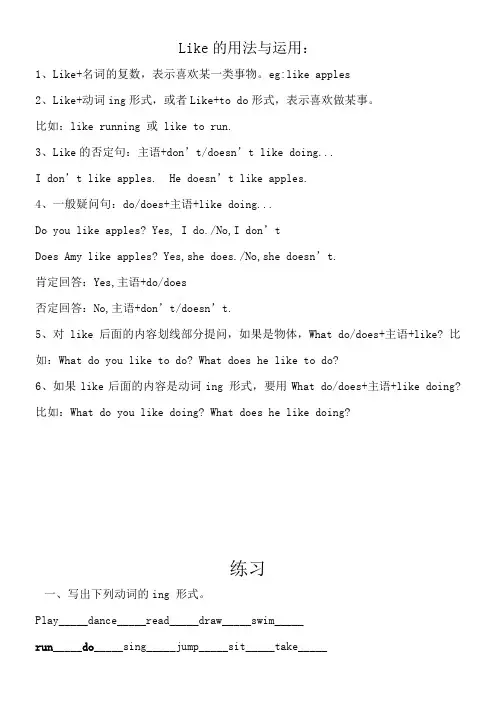
Like的用法与运用:1、Like+名词的复数,表示喜欢某一类事物。
eg:like apples2、Like+动词ing形式,或者Like+to do形式,表示喜欢做某事。
比如:like running 或 like to run.3、Like的否定句:主语+don’t/doesn’t like doing...I don’t like apples. He doesn’t like apples.4、一般疑问句:do/does+主语+like doing...Do you like apples? Yes, I do./No,I don’tDoes Amy like apples? Yes,she does./No,she doesn’t.肯定回答:Yes,主语+do/does否定回答:No,主语+don’t/doesn’t.5、对like后面的内容划线部分提问,如果是物体,What do/does+主语+like? 比如:What do you like to do? What does he like to do?6、如果like后面的内容是动词ing 形式,要用What do/does+主语+like doing? 比如:What do you like doing? What does he like doing?练习一、写出下列动词的ing 形式。
Play_____dance_____read_____draw_____swim_____run_____do_____sing_____jump_____sit_____take_____make_____look_____shop_____eat_____skate_____二、用所给词的适当形式填空。
1、I like _____(play) football.2、I _____(not) like_____(eat) apples.3、He _____(like)_____(draw) trees.4、_____(do) you _____(like) watch TV.5、_____(do)she_____(like)sing.三、句型转换1、Do you like running?(作肯定回答)2、She likes watching TV.3、What does he like to do?(用jump回答)4、Nice to see you again.(写出应答语)5、I like cats and horses.(把I改为“he”,写出句子)___________________________________________________________。
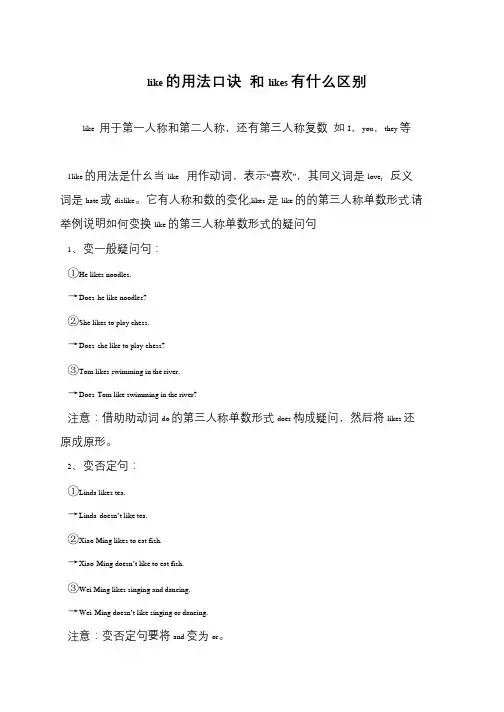
like 的用法口诀和likes 有什么区别like 用于第一人称和第二人称,还有第三人称复数如I,you,they 等
1like 的用法是什幺当like 用作动词,表示“喜欢”,其同义词是love, 反义
词是hate 或dislike。
它有人称和数的变化,likes 是like 的的第三人称单数形式.请举例说明如何变换like 的第三人称单数形式的疑问句
1、变一般疑问句:
①He likes noodles.
→Does he like noodles?
②She likes to play chess.
→Does she like to play chess?
③Tom likes swimming in the river.
→Does Tom like swimming in the river?
注意:借助助动词do 的第三人称单数形式does 构成疑问,然后将likes 还
原成原形。
2、变否定句:
①Linda likes tea.
→Linda doesn’t like tea.
②Xiao Ming likes to eat fish.
→Xiao Ming doesn’t like to eat fish.
③Wei Ming likes singing and dancing.
→Wei Ming doesn’t like singing or dancing.
注意:变否定句要将and 变为or。
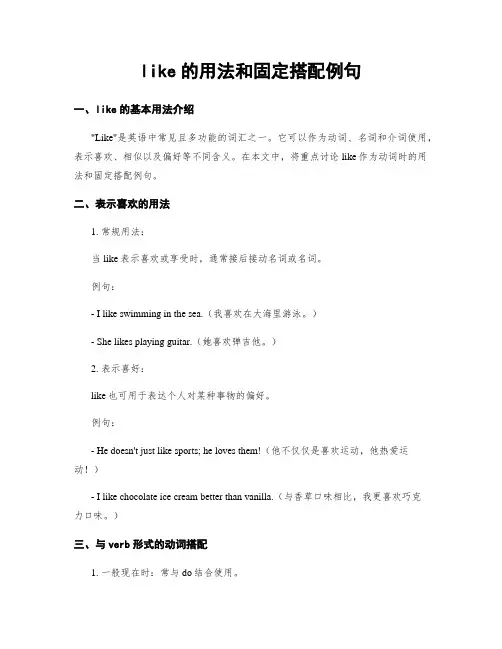
like的用法和固定搭配例句一、like的基本用法介绍"Like"是英语中常见且多功能的词汇之一。
它可以作为动词、名词和介词使用,表示喜欢、相似以及偏好等不同含义。
在本文中,将重点讨论like作为动词时的用法和固定搭配例句。
二、表示喜欢的用法1. 常规用法:当like表示喜欢或享受时,通常接后接动名词或名词。
例句:- I like swimming in the sea.(我喜欢在大海里游泳。
)- She likes playing guitar.(她喜欢弹吉他。
)2. 表示喜好:like也可用于表达个人对某种事物的偏好。
例句:- He doesn't just like sports; he loves them!(他不仅仅是喜欢运动,他热爱运动!)- I like chocolate ice cream better than vanilla.(与香草口味相比,我更喜欢巧克力口味。
)三、与verb形式的动词搭配1. 一般现在时:常与do结合使用。
例句:- Do you like to dance?(你喜欢跳舞吗?)- I don't like to wake up early on weekends.(我周末不喜欢早起。
)2. 过去式:常与did搭配,表示过去的喜好或习惯。
例句:- Did you like the movie we watched last night?(你喜欢昨晚我们看的电影吗?)- She didn't like broccoli when she was a child.(她小时候不喜欢西兰花。
)四、like作为介词时的固定搭配1. feel like + 动名词/代词:表达某人想要做某事的愿望或心情。
例句:- I feel like watching a movie tonight.(我想今晚看电影。
)- She felt like going for a walk after lunch.(午饭后她想散散步。
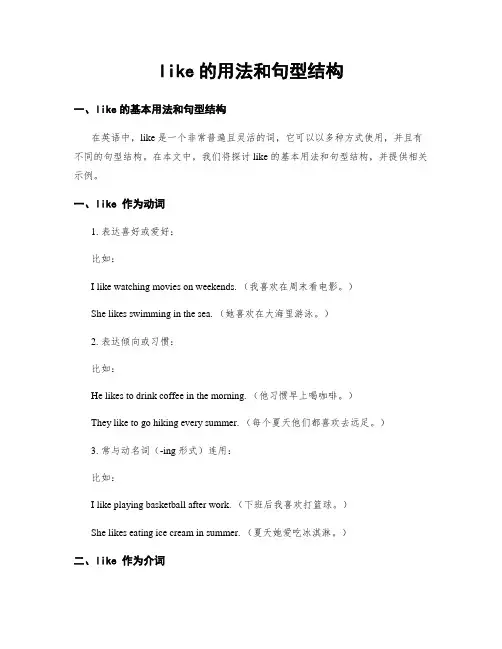
like的用法和句型结构一、like的基本用法和句型结构在英语中,like 是一个非常普遍且灵活的词,它可以以多种方式使用,并且有不同的句型结构。
在本文中,我们将探讨 like 的基本用法和句型结构,并提供相关示例。
一、like 作为动词1. 表达喜好或爱好:比如:I like watching movies on weekends. (我喜欢在周末看电影。
)She likes swimming in the sea. (她喜欢在大海里游泳。
)2. 表达倾向或习惯:比如:He likes to drink coffee in the morning. (他习惯早上喝咖啡。
)They like to go hiking every summer. (每个夏天他们都喜欢去远足。
)3. 常与动名词(-ing 形式)连用:比如:I like playing basketball after work. (下班后我喜欢打篮球。
)She likes eating ice cream in summer. (夏天她爱吃冰淇淋。
)二、like 作为介词1. 表示相似之处或比较:比如:He looks like his brother. (他长得像他哥哥。
)This place is like a paradise. (这个地方就像天堂一样。
)2. 表示兴趣或爱好的相似性:比如:John plays the piano like his father. (约翰弹钢琴像他父亲一样。
)They dance like professionals. (他们跳舞像职业舞者一样。
)三、like 作为连词1. 用于引导比较句:比如:She dances like a professional, but he dances just for fun. (她跳舞像专业人士,而他只是为了好玩儿。
)My brother plays soccer like a pro, while I'm still learning. (我哥哥踢足球像个职业球员,而我仍在学习中。
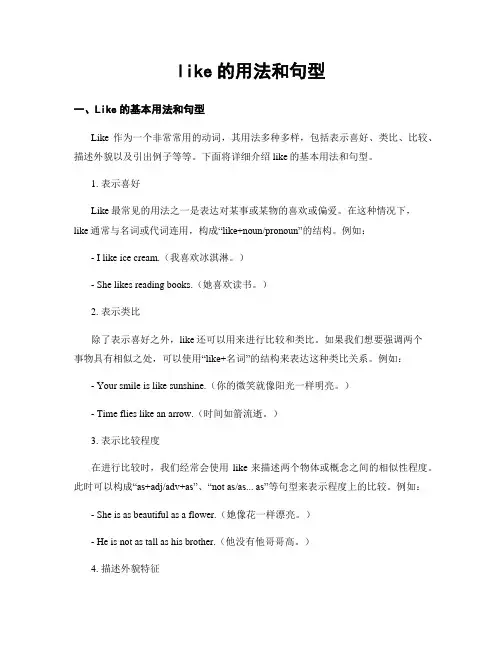
like的用法和句型一、Like的基本用法和句型Like作为一个非常常用的动词,其用法多种多样,包括表示喜好、类比、比较、描述外貌以及引出例子等等。
下面将详细介绍like的基本用法和句型。
1. 表示喜好Like最常见的用法之一是表达对某事或某物的喜欢或偏爱。
在这种情况下,like通常与名词或代词连用,构成“like+noun/pronoun”的结构。
例如:- I like ice cream.(我喜欢冰淇淋。
)- She likes reading books.(她喜欢读书。
)2. 表示类比除了表示喜好之外,like还可以用来进行比较和类比。
如果我们想要强调两个事物具有相似之处,可以使用“like+名词”的结构来表达这种类比关系。
例如:- Your smile is like sunshine.(你的微笑就像阳光一样明亮。
)- Time flies like an arrow.(时间如箭流逝。
)3. 表示比较程度在进行比较时,我们经常会使用like来描述两个物体或概念之间的相似性程度。
此时可以构成“as+adj/adv+as”、“not as/as... as”等句型来表示程度上的比较。
例如:- She is as beautiful as a flower.(她像花一样漂亮。
)- He is not as tall as his brother.(他没有他哥哥高。
)4. 描述外貌特征我们可以使用like来描述一个人或物体的外观、特征或性质。
这时,like常与形容词连用,构成“look/feel/sound/smell/taste like+形容词”的结构。
例如:- The smell in the kitchen is like rotten eggs.(厨房里的气味像腐烂的鸡蛋一样。
)- Her voice sounds like angels singing.(她的声音听起来像天使在唱歌。
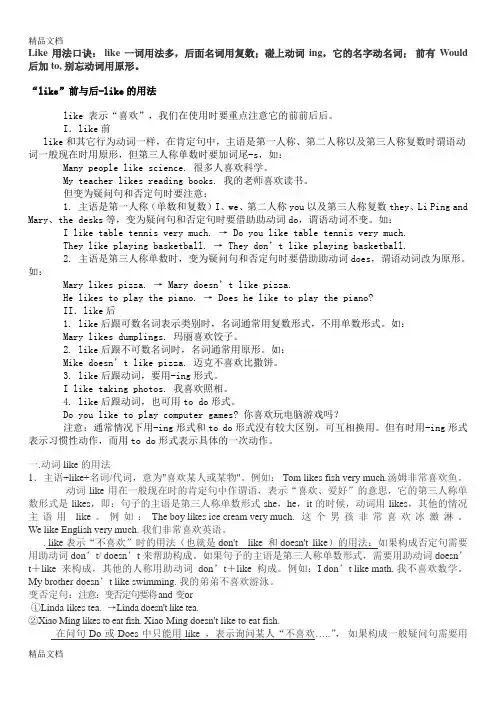
Like用法口诀: like一词用法多,后面名词用复数;碰上动词ing,它的名字动名词;前有Would 后加to, 别忘动词用原形。
“like”前与后-like的用法like 表示“喜欢”,我们在使用时要重点注意它的前前后后。
I.like前like和其它行为动词一样,在肯定句中,主语是第一人称、第二人称以及第三人称复数时谓语动词一般现在时用原形,但第三人称单数时要加词尾-s,如:Many people like science. 很多人喜欢科学。
My teacher likes reading books. 我的老师喜欢读书。
但变为疑问句和否定句时要注意:1. 主语是第一人称(单数和复数)I、we、第二人称you以及第三人称复数they、Li Ping and Mary、the desks等,变为疑问句和否定句时要借助助动词do,谓语动词不变。
如:I like table tennis very much. → Do you like table tennis very much.They like playing basketball. → They don’t like playing basketball.2. 主语是第三人称单数时,变为疑问句和否定句时要借助助动词does,谓语动词改为原形。
如:Mary likes pizza. → Mary doesn’t like pizza.He likes to play the piano. → Does he like to play the piano?II.like后1. like后跟可数名词表示类别时,名词通常用复数形式,不用单数形式。
如:Mary likes dumplings. 玛丽喜欢饺子。
2. like后跟不可数名词时,名词通常用原形。
如:Mike doesn’t like pizza. 迈克不喜欢比撒饼。
3. like后跟动词,要用-ing形式。
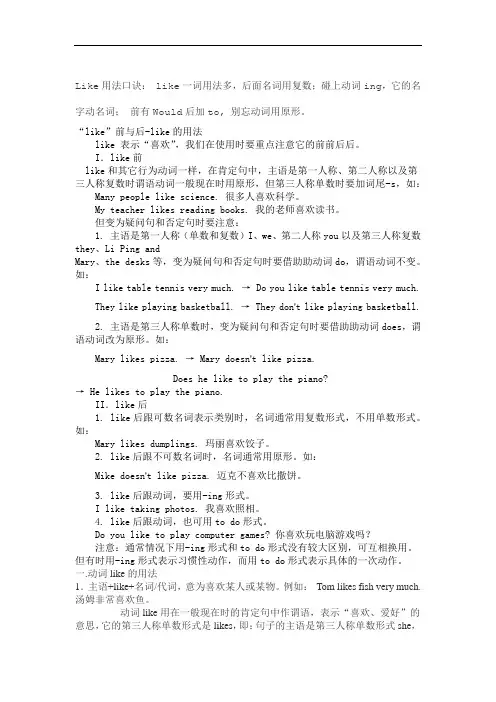
Like用法口诀: like一词用法多,后面名词用复数;碰上动词ing,它的名字动名词;前有Would后加to, 别忘动词用原形。
“like”前与后-like的用法like 表示“喜欢”,我们在使用时要重点注意它的前前后后。
I.like前like和其它行为动词一样,在肯定句中,主语是第一人称、第二人称以及第三人称复数时谓语动词一般现在时用原形,但第三人称单数时要加词尾-s,如: Many people like science. 很多人喜欢科学。
My teacher likes reading books. 我的老师喜欢读书。
但变为疑问句和否定句时要注意:1. 主语是第一人称(单数和复数)I、we、第二人称you以及第三人称复数they、Li Ping andMary、the desks等,变为疑问句和否定句时要借助助动词do,谓语动词不变。
如:I like table tennis very much. → Do you like table tennis very much.They like playing basketball. → They don't like playing basketball.2. 主语是第三人称单数时,变为疑问句和否定句时要借助助动词does,谓语动词改为原形。
如:Mary likes pizza. → Mary doesn't like pizza.Does he like to play the piano?→ He likes to play the piano.II.like后1. like后跟可数名词表示类别时,名词通常用复数形式,不用单数形式。
如:Mary likes dumplings. 玛丽喜欢饺子。
2. like后跟不可数名词时,名词通常用原形。
如:Mike doesn't like pizza. 迈克不喜欢比撒饼。
3. like后跟动词,要用-ing形式。
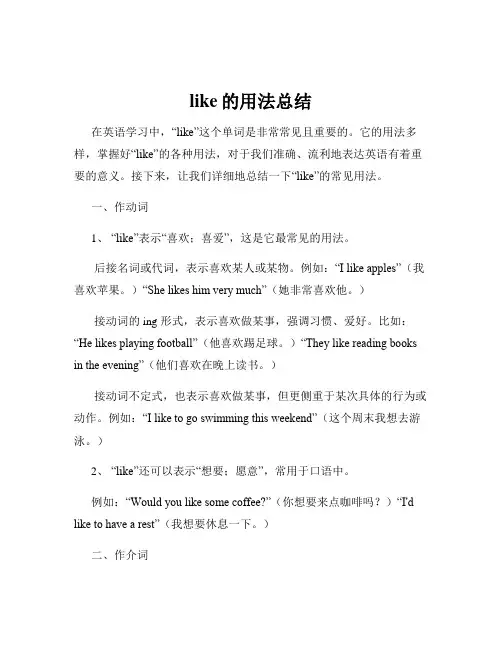
like的用法总结在英语学习中,“like”这个单词是非常常见且重要的。
它的用法多样,掌握好“like”的各种用法,对于我们准确、流利地表达英语有着重要的意义。
接下来,让我们详细地总结一下“like”的常见用法。
一、作动词1、“like”表示“喜欢;喜爱”,这是它最常见的用法。
后接名词或代词,表示喜欢某人或某物。
例如:“I like apples”(我喜欢苹果。
)“She likes him very much”(她非常喜欢他。
)接动词的 ing 形式,表示喜欢做某事,强调习惯、爱好。
比如:“He likes playing football”(他喜欢踢足球。
)“They like reading books in the evening”(他们喜欢在晚上读书。
)接动词不定式,也表示喜欢做某事,但更侧重于某次具体的行为或动作。
例如:“I like to go swimming this weekend”(这个周末我想去游泳。
)2、“like”还可以表示“想要;愿意”,常用于口语中。
例如:“Would you like some coffee?”(你想要来点咖啡吗?)“I'd like to have a rest”(我想要休息一下。
)二、作介词1、“like”作介词时,意为“像;如同”。
用于比较,表示“与……相似”。
例如:“He looks like his father”(他长得像他父亲。
)“This bag is like that one”(这个包和那个包相似。
)用于举例,表示“例如;像……这样”。
比如:“There are many fruits like apples, bananas and or anges”(有很多水果,像苹果、香蕉和橙子。
)2、“like”与“what”连用,构成“What'slike?”句型,用于询问“……怎么样?”例如:“What's the weather like today?”(今天天气怎么样?)“What's the new teacher like?”(新老师怎么样?)三、常见的搭配和短语1、“feel like”,表示“想要;感觉像”。
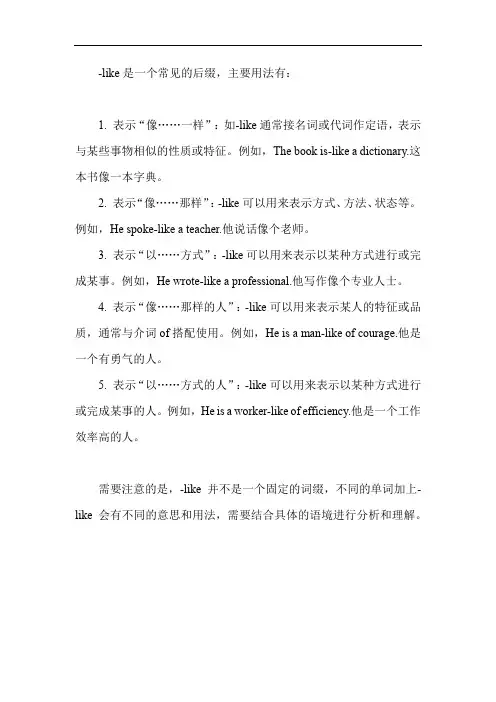
-like是一个常见的后缀,主要用法有:
1. 表示“像……一样”:如-like通常接名词或代词作定语,表示与某些事物相似的性质或特征。
例如,The book is-like a dictionary.这本书像一本字典。
2. 表示“像……那样”:-like可以用来表示方式、方法、状态等。
例如,He spoke-like a teacher.他说话像个老师。
3. 表示“以……方式”:-like可以用来表示以某种方式进行或完成某事。
例如,He wrote-like a professional.他写作像个专业人士。
4. 表示“像……那样的人”:-like可以用来表示某人的特征或品质,通常与介词of搭配使用。
例如,He is a man-like of courage.他是一个有勇气的人。
5. 表示“以……方式的人”:-like可以用来表示以某种方式进行或完成某事的人。
例如,He is a worker-like of efficiency.他是一个工作效率高的人。
需要注意的是,-like并不是一个固定的词缀,不同的单词加上-like会有不同的意思和用法,需要结合具体的语境进行分析和理解。
like的用法和句子一、like的基本用法like作为一个多功能词,在英语中有许多不同的用法和句子结构。
下面将分别介绍like作为动词、介词和连词的用法,并举例说明。
1. like作为动词:当like用作动词时,它常表示喜欢、爱好或享受某种活动。
例如:- I really like chocolate ice cream.(我非常喜欢巧克力冰淇淋。
)此外,like还可以表示给予好感或帮助。
例如:- My parents always like to support me in whatever I do.(无论我做什么,我的父母总是愿意支持我。
)2. like作为介词:在这个意义上,like相当于as if或similar to,在句子中引出比较对象。
例如:- She looks like her mother. (她看起来像她的妈妈。
)- He sings like an angel. (他唱歌就像天使一样。
)3. like作为连词:在这种情况下,like常常连接两个名词或名词短语,并且可以用来引述话语或描述人物行为等。
例如:- She's a great dancer, just like her sister. (她是一位很棒的舞者,就像她姐姐一样。
)- He was shouting and screaming, just like a madman. (他又喊又叫,就像一个疯子一样。
)二、like在不同句型中的运用除了基本用法之外,like还可以根据所配合的不同句型来扩展其用法。
下面将介绍常见的几种语法结构,并给出例句。
1. 带宾语的like:这种结构中,like后接名词或代词作为宾语。
例如:- I like pizza. (我喜欢披萨。
)- Do you like her? (你喜欢她吗?)2. 带动名词的like:在这种情况下,like后面接动名词作宾补,表示“享受”或“乐于从事”的意思。
likes的用法和搭配一、likes的基本用法和意义在英语中,动词"like"是一个非常常见且重要的词汇。
它表示喜欢、倾向或赞同某事物或行为。
由于其广泛应用和搭配丰富,掌握"like"的正确用法及常见搭配对于学习英语的人来说至关重要。
1. like的基本用法Like作为一个动词,可用于不同语境和句子结构中。
通常,like后接名词或代词作宾语,并被用来表达对某个事物的喜好或感觉。
例如:- I like ice cream.(我喜欢冰淇淋)- They don't like Mondays.(他们不喜欢星期一)此外,在口语中也可以使用like单独作为一个谓语动词来表示喜好。
例如:- A: Do you like sushi?(你喜欢寿司吗?)- B: Yes, I do. / No, I don't.(是的/不)此时,“do”起到辅助动词的作用,表示否定时,在“don't”后面加上“not”。
2. 搭配动词+like除了直接使用"like"表达自己的喜好之外,我们还可以与其他动词搭配使用,“动词+like”的结构常用于描述喜欢或擅长某个行为。
例如:- I feel like going for a walk.(我想出去散步)- He looks like he's about to cry.(他看起来好像要哭了)- She sounds like she knows what she's talking about.(她听上去好像知道自己在说什么)这些语句中的动词都与"like"搭配使用,增强了句子表达的效果。
二、likes的高级搭配和常见短语除了基本用法之外,"like"还可以与其他词汇、介词、副词等进行搭配,形成一些固定的短语和表达方式。
下面将介绍一些常见的likes的高级搭配和常用短语。
一、like作动词用。
1.有“喜欢”,“喜爱”之意。
其后接名词、代词、动词不定式、动词ing形式或复合宾语。
如:Most students like pop songs.大多数学生喜欢流行歌曲。
Do you like it ?你喜欢它吗?I don't like to speak in public.我不喜欢在公共场合说话。
Do you like working in China? 你喜欢在中国工作吗?I like people to tell the truth. 我喜欢人讲真话。
She doesn't like people praising in front of her.她不喜欢别人当面表扬她。
2.有“愿意”、“想要”之意,常与should, would连用,后可接名词、不定式、或复合宾语。
如:I'd like a cup of tea.我想喝杯茶。
I'd like to see your ten speed bicycles.我想看看你们的十速自行车。
I would like you to stay in the company.我希望你留在公司。
3.在“Ho do you like ?”这一句型中,通常是询问对方对某个地方或某样东西的看法。
意为“你觉得怎么样”如:How do you like China?你觉得中国怎么样?二、like作介词用,有“象一样”的含义。
1.常与be ,look等连系动词连用,作表语。
What is he like?他是怎么样一个人?It looks like a cat.它看上去象只猫。
2.表示方式,用作状语。
Don't throw it like that.别那样扔。
It's not polite to speak to the old man like that.象那样跟老人讲话是不礼貌的。
3.修饰前面的名词或代词,作后置定语。
“like”前与后-like的用法like 表示“喜欢”,我们在使用时要重点注意它的前前后后。
I.like前like和其它行为动词一样,在肯定句中,主语是第一人称、第二人称以及第三人称复数时谓语动词一般现在时用原形,但第三人称单数时要加词尾-s,如:Many people like science. 很多人喜欢科学。
My teacher likes reading books. 我的老师喜欢读书。
但变为疑问句和否定句时要注意:1. 主语是第一人称(单数和复数)I、we、第二人称you以及第三人称复数they、Li Ping and Mary、the desks等,变为疑问句和否定句时要借助助动词do,谓语动词不变。
如:I like table tennis very much. → Do you like table tennis very much.They like playing basketball. → They don’t like playing basketball.2. 主语是第三人称单数时,变为疑问句和否定句时要借助助动词does,谓语动词改为原形。
如:Mary likes pizza. → Mary doesn’t like pizza.He likes to play the piano. → Does he like to play the piano?II.like后1. like后跟可数名词表示类别时,名词通常用复数形式,不用单数形式。
如:Mary likes dumplings. 玛丽喜欢饺子。
2. like后跟不可数名词时,名词通常用原形。
如:Mike doesn’t like pizza. 迈克不喜欢比撒饼。
3. like后跟动词,要用-ing形式。
I like taking photos. 我喜欢照相。
4. like后跟动词,也可用to do形式。
Do you like to play computer games? 你喜欢玩电脑游戏吗?注意:通常情况下用-ing形式和to do形式没有较大区别,可互相换用。
like 像的用法
like 像的用法如下:
①like是介词,后接名词或代词。
“like+宾语”可以作表语、定语或状语;as是连词,引导比较状语从句或方式状语从句。
②as可用作关系代词或关系副词,引导定语从句,先行词为整个句子,可以放在主语前或后;like则没有这种用法。
③表示“像”时,like只表示单纯比较,而as则表示同类比较。
She looks like her mother. 她看起来像她母亲。
You should do as I told you. 你应该按我告诉你的方式去做。
(方式)
It is as cold today as yesterday. 今天同昨天一样冷。
(as后省略it was)
As is known to all,pride goes before a fall. 众所周知,骄者必败。
Man can be his own master,as we all know. 人可以成为自己命运的主人,这一点大家都知道。
Like her father,she is ready to help others. 她像她父亲一样乐于助人。
(单纯比较)
He speaks English as an Englishman. 他说英语就像是个英国人。
(同类比较)。
like的用法和搭配1. Like作为动词,用于表示喜欢或享受某事物。
- I really like chocolate.2. Like常用于句子的结尾,用于引入一个例子或类似的事物。
- I love fruits like apples and oranges.3. Like可以用于表示一个人或事物的特征或属性。
- She has curly hair, just like her mother.4. Like可以用于进行比较,表示两者相似或类似。
- She runs like a cheetah.5. Like用于表示态度或观点。
- I feel like this is a bad idea.6. Like可以用于口语中添加语气,类似于“um”或“well”。
- So, like, we were at the mall, and then, like, this guy came up to us.7. Like可以与介词一起使用,搭配形成固定短语。
- feel like (感觉像): I feel like I need a vacation.- look like (看起来像): She looks like her sister.- act like (表现像): He acts like a child sometimes.- sound like (听起来像): It sounds like someone is knocking on the door.- smell like (闻起来像): The flowers smell like roses.8. Like可以用作连词,引导比较或类似的事物。
- He eats like a horse, but she eats like a bird.注意:以上是like的常见用法和搭配,但like还有其他用法和搭配,在不同上下文中可能有不同的含义和用法。
“like”前与后-like的用法
like 表示“喜欢”,我们在使用时要重点注意它的前前后后。
I.like前
like和其它行为动词一样,在肯定句中,主语是第一人称、第二人称以及第三人称复数时谓语动词一般现在时用原形,但第三人称单数时要加词尾-s,如:
Many people like science. 很多人喜欢科学。
My teacher likes reading books. 我的老师喜欢读书。
但变为疑问句和否定句时要注意:
1. 主语是第一人称(单数和复数)I、we、第二人称you以及第三人称复数they、Li Ping and Mary、the desks等,变为疑问句和否定句时要借助助动词do,谓语动词不变。
如:
I like table tennis very much. → Do you like table tennis very much.
They like playing basketball. → They don’t like playing basketball.
2. 主语是第三人称单数时,变为疑问句和否定句时要借助助动词does,谓语动词改为原形。
如:
Mary likes pizza. → Mary doesn’t like pizza.
He likes to play the piano. → Does he like to play the piano?
II.like后
1. like后跟可数名词表示类别时,名词通常用复数形式,不用单数形式。
如:
Mary likes dumplings. 玛丽喜欢饺子。
2. like后跟不可数名词时,名词通常用原形。
如:
Mike doesn’t like pizza. 迈克不喜欢比撒饼。
3. like后跟动词,要用-ing形式。
I like taking photos. 我喜欢照相。
4. like后跟动词,也可用to do形式。
Do you like to play computer games? 你喜欢玩电脑游戏吗?
注意:通常情况下用-ing形式和to do形式没有较大区别,可互相换用。
但有时用-ing形式表示习惯性动作,而用to do形式表示具体的一次动作。